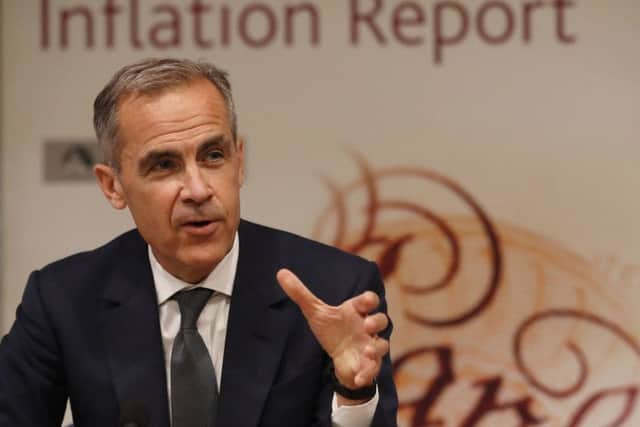Will Holman: Bank of England's balancing act on interest rates


We cut interest rates to exceptionally low levels during the financial crisis to support spending and to reduce the number of people out of work.
And we’ve kept rates very low over recent years to help the economy recover from the global financial crisis.
Advertisement
Hide AdAdvertisement
Hide AdTo use a motoring analogy, we’ve kept our foot firmly on the accelerator.


Now things are changing: the world economy is growing strongly. And here in the UK the share of people without a job is at its lowest level for more than 40 years.
At the same time, we’ve seen inflation rise above the Bank’s 2 per cent target since the big fall in the pound following the Brexit vote, which pushed up the cost of imports. Businesses typically have to pass those rising costs on to their customers. So we’ve seen higher prices in the shops.
But the weaker pound also brings advantages.
For example, it has helped increase the competitiveness of some UK exports, at a time when demand is being supported by strong growth in Europe, the United States and other countries.
Advertisement
Hide AdAdvertisement
Hide Ad

This growth should encourage exporters to invest and recruit more staff.
Whilst we have seen some evidence of this happening, the pick-up in investment has been weaker than we might otherwise have expected based on past experience. It is likely that uncertainty surrounding Brexit has weighed on some companies’ investment decisions.
Of course, economies don’t just involve businesses. People play a vital part too.
Over the past year, prices have been rising faster than wages and that has squeezed the spending power of households. This is something we’ve heard a lot about through our conversations with community groups and debt advice bodies here in Yorkshire.
Advertisement
Hide AdAdvertisement
Hide Ad

The good news is that we think that squeeze is likely to start easing.
The share of people out of work in the UK is now at its lowest level since 1975; Yorkshire’s jobless rate of 5 per cent is very low by the standards of recent history.
And there are lots of job vacancies. We hear from our business contacts in Yorkshire about how they need to compete hard with each other to recruit and retain workers, particularly in hotspots like IT, which is leading some to offer higher wages.
Of course, higher wages can also lead to inflation, as businesses look to recoup their increased costs by increasing their prices.
Advertisement
Hide AdAdvertisement
Hide Ad

Faced with these inflationary pressures, the Bank needs to think carefully about whether the level of support we’re providing to the economy is appropriate.
If we set interest rates too low, then the economy will grow too fast, keeping inflation above our 2 per cent target.
But if we set interest rates too high or raise them too rapidly then growth will be too slow, and inflation could fall below target.
Put another way, we need to keep the economy growing at its ‘speed limit’.
Advertisement
Hide AdAdvertisement
Hide AdWe think the current speed limit of the UK economy is annual growth of around 1.5 per cent but our latest forecast suggests it is on track to grow a bit faster than that.
So we think it needs a little less support from us.


Last November we raised the official interest rate we set, known as Bank Rate, from 0.25 per cent to 0.5 per cent.
Although the Bank’s Monetary Policy Committee voted to keep rates at 0.5 per cent this month, they also indicated that, if the economy performs as expected, it would be necessary to raise them again to prevent the economy from overheating.
But they also stressed that any further rises are likely to happen at a gradual pace and to a limited extent. So interest rates are likely to remain substantially lower than a decade ago.
Advertisement
Hide AdAdvertisement
Hide AdThis isn’t a case of putting the brakes on; we’re just easing the foot off the accelerator a little.
And we’re doing that because, ten years on from the financial crisis, the economy is finally returning to normal. That’s got to be welcome news for households and businesses here in Yorkshire & Humber.
- Will Holman is the Deputy Agent for the Bank of England in Yorkshire & the Humber. Here he looks at the state of the regional and national economy.